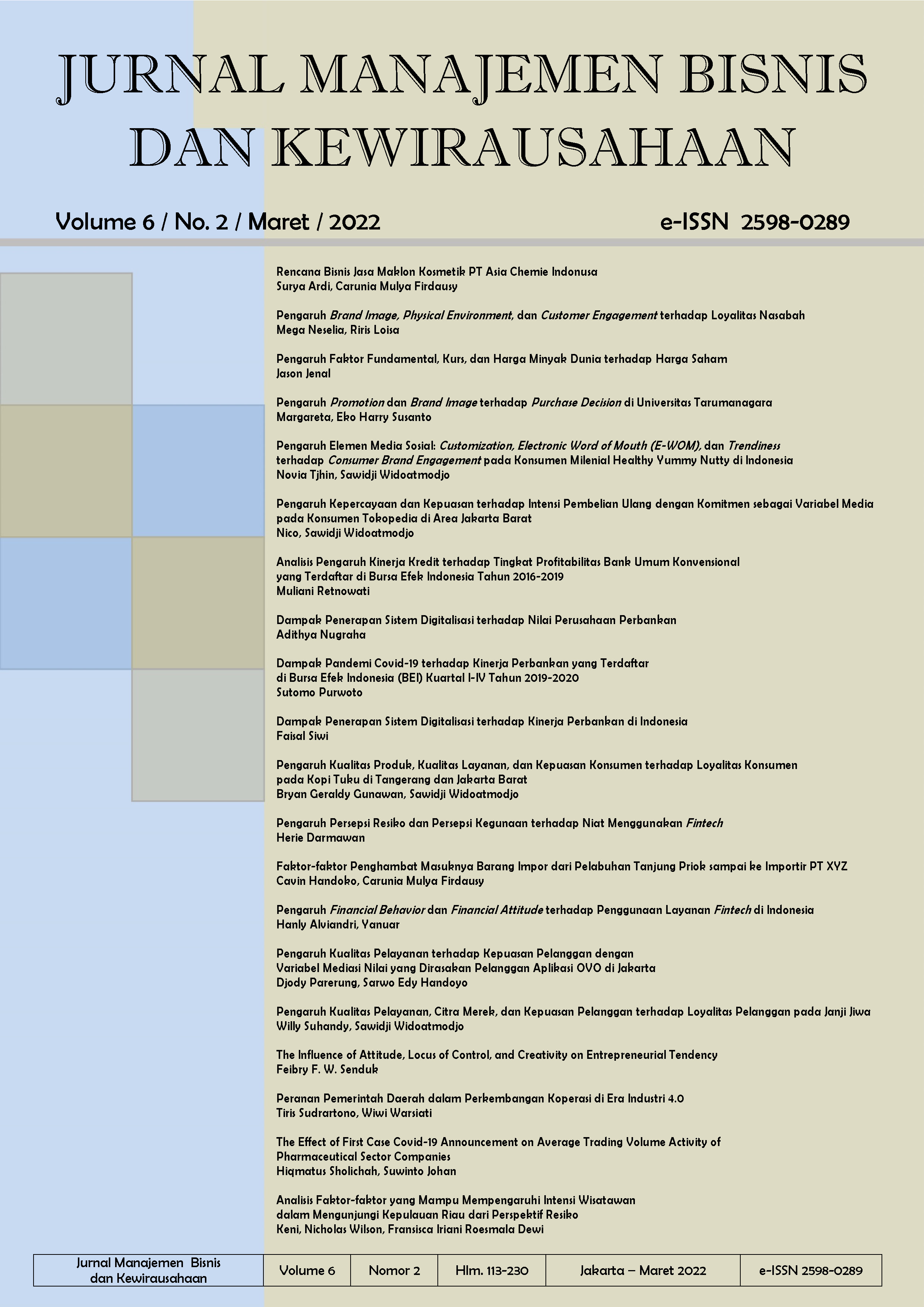Pengaruh Financial Behavior dan Financial Attitude terhadap Penggunaan Layanan Fintech di Indonesia
Main Article Content
Abstract
This study describes the impacts of financial behavior and financial attitude towards the constructs in the Technology Acceptance Model and its implication towards the attitude of using fintech services in Indonesia. Variables adopted from the technology acceptance model are perceived ease of use, perceived usefulness, and attitude towards using. Descriptive quantitative research was conducted by collecting data using an online questionnaire survey using a google form, which was then analyzed by using the structural equation model method through SmartPLS software. The results showed that financial behavior and financial attitude has an impact on customers' attitude towards using financial technology services in Indonesia. Therefore, this study may be able to provide insights for financial institutions to design, maintain or increase application’s ease of use and usefulness in fulfilling customers' financial behavior and financial attitude-related activities efficiently and effectively.
Penelitian ini bertujuan untuk mendeskripsikan pengaruh sikap dan perilaku keuangan terhadap konstruk technology acceptance model dan implikasinya terhadap penggunaan layanan fintech di Indonesia. Beberapa variabel yang diadopsi dari technology acceptance model sendiri antara lain persepsi kemudahan, persepsi kegunaan, dan sikap terhadap penggunaan. Penelitian ini menggunakan jenis penelitian dengan pendekatan deskriptif kuantitatif dengan sumber data yang dikumpulkan menggunakan kuesioner online melalui media Google Form yang berisikan pertanyaan kepada para sampel yang menggunakan scaling questions yang kemudian akan dianalisis dengan menggunakan metode structural equation model (SEM) melalui aplikasi SmartPLS. Hasil dari penelitian ini adalah memberikan informasi bahwa sikap dan perilaku keuangan dari individu memiliki pengaruh terhadap sikap masyarakat dalam menggunakan layanan fintech di Indonesia yang bisa digunakan oleh institusi keuangan sebagai sumber dalam merancang, menjaga, atau meningkatkan aplikasi yang mudah dan bermanfaat bagi konsumen dalam memenuhi kebutuhannya yang berkaitan dengan perilaku dan sikap keuangan secara efektif dan efisien.
Article Details
This work is licensed under a Jurnal Manajemen Bisnis dan Kewirausahaan Creative Commons Attribution-ShareAlike 4.0 International License.
References
Anthony, R., Ezat, W. S., Junid, S. Al, & Moshiri, H. (2011). Financial management attitude and practice among the medical practitioners in public and private medical service in Malaysia. International Journal of Business and Management, 6(8), 105–113. https://doi.org/10.5539/ijbm.v6n8p105
Chuang, L.-M., Liu, C.-C., & Kao, H.-K. (2016). The Adoption of Fintech Service: TAM perspective. International Journal of Management and Administrative Sciences (IJMAS), 3(07), 1–15. https://www.ijmas.org/3-7/IJMAS-3601-2016.pdf
Davis, F. D. (1986). A technology acceptance model for empirically testing new end-user information systems: Theory and results [Sloan School of Management]. https://dspace.mit.edu/bitstream/handle/1721.1/15192/14927137-MIT.pdf?sequence=2&isAllowed=y
Frederiks, E. R., Stenner, K., & Hobman, E. V. (2015). Household energy use: Applying behavioural economics to understand consumer decision-making and behaviour. Renewable and Sustainable Energy Reviews, 41, 1385–1394. https://doi.org/10.1016/j.rser.2014.09.026
Hu, Z., Ding, S., Li, S., Chen, L., & Yang, S. (2019). Adoption intention of fintech services for bank users: An empirical examination with an extended technology acceptance model. Symmetry, 11(3), 340–355. https://doi.org/10.3390/sym11030340
Legris, P., Ingham, J., & Collerette, P. (2003). Why do people use information technology? A critical review of the technology acceptance model. Information and Management, 40(3), 191–204. https://doi.org/10.1016/S0378-7206(01)00143-4
Mokhtar, S. A., Katan, H., & Hidayat-ur-Rehman, I. (2018). Instructors’ behavioural intention to use Learning Management system: An integrated TAM perspective. TEM Journal, 7(3), 513–525. https://doi.org/10.18421/TEM73-07
Pappalardo, J. K. (2012). Product literacy and the economics of consumer protection policy. Journal of Consumer Affairs, 46(2), 319–332. https://doi.org/10.1111/j.1745-6606.2012.01233.x
Perry, V. G., & Morris, M. D. (2005). Who is in control? The role of self-perception, knowledge, and income in explaining consumer financial behavior. Journal of Consumer Affairs, 39(2), 299–313. https://doi.org/10.1111/j.1745-6606.2005.00016.x
Schueffel, P. (2016). Taming the beast: A scientific definition of fintech. Journal of Innovation Management, 4(4), 32–54. https://doi.org/10.24840/2183-0606_004.004_0004
Svendsen, G. B., Johnsen, J. A. K., Almås-Sørensen, L., & Vittersø, J. (2013). Personality and technology acceptance: The influence of personality factors on the core constructs of the Technology Acceptance Model. Behaviour and Information Technology, 32(4), 323–334. https://doi.org/10.1080/0144929X.2011.553740
Venkatesh, V., Thong, J. Y. L., & Xu, X. (2012). Consumer acceptance and use of information technology: Extending the unified theory of acceptance and use of technology. MIS Quarterly: Management Information Systems, 36(1), 157–178. https://doi.org/10.2307/41410412
Vieira, K. M., Potrich, A. C. G., & Mendes-Da-Silva, W. (2018). A financial literacy model for university students. Individual Behaviors and Technologies for Financial Innovations, 39(3), 69–95. https://doi.org/10.1007/978-3-319-91911-9_4


